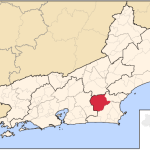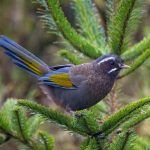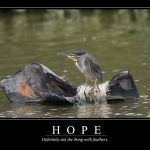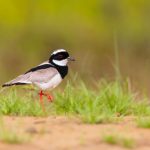One of the most persistent myths in the annals of avifauna has to be the prohibition on handling even the most imperiled chick or egg, lest its parent reject the tainted wretch out of hand. Why the human stain should prove so deleterious to bird sensibilities is lost to history but this old chestnut survives in the face of conflicting evidence; it certainly outlived that old trope about storks and birds. This superstition doesn’t stop naturalists from banding and ringing birds with abandon, but then again, with the relentless declines in species counts across the board, it suddenly seems within the realm of possibility that the mighty myth sprung from a seed of truth.
Thankfully, the compassionate folks at Scientific American have delivered a welcome reality check. Do birds (and other critters) abandon their young at the slightest human touch?
In a word, no.
Robynne Boyd, the author of this Weird Science article, debunks the idea that birds are repulsed by human scent:
Actually, birds have relatively small and simple olfactory nerves, which limit their sense of smell. There are very few birds with extraordinary olfaction and these represent specialized adaptations. For example, turkey vultures are attracted to methyl mercaptan, a gas produced by decaying organic matter (and added to natural gas to make it smell bad), while starlings can detect insecticidal compounds in vegetation, which they utilize to keep their nests bug-free. Yet no bird’s sense of smell is cued to human scent.
Frank B. Gill, former president of the American Ornithologists’ Union, adds more in support of the fact that a bird won’t abandon its young in response to human touch:
If a bird’s nest is disturbed by a potential predator during the nesting or egg-laying stage, there’s a possibility that [it] will desert and re-nest. However, once the young are hatched and feeding, [their parents are] by and large pretty tenacious.
However, just because one can touch an endangered avian in extreme circumstances does not mean that people should manhandle birds with impunity. Most birds are understandably averse to human disturbance and will go so far as to abandon a nest in response to excessive trespass. Still, helping a lost chick is, for all but the clumsiest caretakers, a modest infraction of nature’s zoning laws, one that offers more potential benefit than harm. This is why busting the pernicious myth about bird handling is so important; too many good Samaritans feel forced to inaction, paralyzed by the perceived catch-22 of either leaving a lost bird to its doom or sealing its fate with an errant touch. This month, Scientific American has done its part, so now it’s up to the rest of us to share the good news. Go ahead and help that baby bird… its mother might thank you!














This is one of the most commonly asked questions of me at the banding station!
There might be a grain of truth in it though. In Germany, we say that “a nest found is a nest lost” (although we use German words for it).
It is quite striking that many times a nest gets abandoned or breeding fails after humans have checked the nest. This happens quite regularly in cases of rare breeding records when nests are visited to band/ring the birds or obtain proof/documentation of breeding. The most likely explanation is that mammalian predators follow the human scent trail to see what they had been up to and subsequently are guided indirectly to the nest, which they then consider a welcome yet unexpected little snack.
So it appears that after humans handled the young birds, the nest was abandoned.
I’ve been asked this many times on my field trips too. I see Jochen’s point, but I think it’s a risk worth taking. A nestling on the ground is all but guaranteed death, but the human action at least gives it a chance.
Jochen, how exactly do you say that in German? I can only imagine the incalculable field cred I’d get if I dropped that pearl of wisdom in its original tongue.
“Ein gefundenes Nest ist ein verlorenes Nest”
But that, of course, only pertains to nests, not lost young birds outside their nest.
What you say is correct, but I worry that it could give the wrong impression since you don’t really distinguish between nestlings and fledglings — far, far too many well-meaning “rescuers” will try to care for a fledgling whose parents are almost certainly nearby, waiting for the human to go away so they can feed it. Probably one of those “too obvious to think about pointing out” things….
Actually, that’s not obvious at all, Andrea. Excellent point! Thanks for making that important distinction.